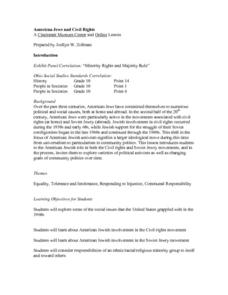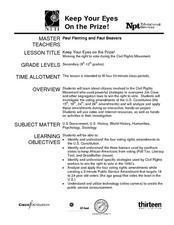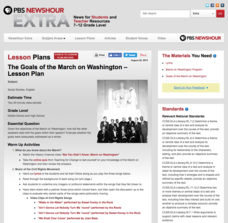Stanford University
Civil Rights or Human Rights?
Young citizens consider the American civil rights movement as part of the global struggle for human rights. After using a timeline activity to learn about the major events in the civil rights movement, class members study Malcolm X's...
Curated OER
American Jews and Civil Rights
Tenth graders examine the Civil Rights movement of the 1960's and how American Jews were involved. They discuss the responsibilities of any minority or ethnic group. They consider the process of change in politics as well.
Curated OER
Civil Rights Video Essay
Students investigate a decade of American history when the civil rights movement was a focus of national attention. They create a video essay about a person or event that played an important role in shaping the civil rights movement.
Curated OER
The Movement Before the Movement: Civil Rights Activism in the 1940s
Many educators focus on the civil rights movement as it occurred after Rosa Parks incited the bus boycott. Extend the understanding of the fight for civil rights in the United States with this post-WWII lesson. Learners examine and...
Curated OER
Civil Rights in America
Seventh graders visit the Smithsonian and are shown different exhibits. They are to make their own drawing about one of the exhibits and write about the experience.
PBS
Making Change: Revolutionary Tactics of the Civil Rights Movement
The film American Revolutionary: The Evolution of Grace Lee Boggs introduces viewers to the differing philosophies of and strategies employed by 1960s civil rights leaders such as Malcolm X and Martin Luther King, Jr. and the debate over...
PBS
Martin Luther King Jr.: Civil Rights Leader
Expand class members' appreciation of the work of Dr. Martin Luther King, Jr. A powerful resource examines King's speeches, writings, and actions that reveal his deep commitment to a nonviolent approach to Civil Rights. Learners watch a...
PBS
Muhammad Ali: Boxer and Civil Rights Activist
Many young people today know Muhammad Ali as the aging boxer who lit the torch at the 1996 Olympics. Introduce young historians to Ali the boxer, the Civil Rights activist, the war protestor, and the humanitarian with a powerful lesson...
PBS
Malcolm X: Minister and Civil Rights Activist
Any study of the leaders of the Civil Rights Movement would be incomplete without an examination of the life of Malcolm X. Class members view a short biographical video and analyze primary source documents to gain an understanding of the...
Curated OER
Development of Federal Civil Rights Acts : 1950's - Present
Students use the Internet to research one of five cases associated with Brown v. Board of Education and then join a group with people who researched the other four.
NPR
Civil Rights of Japanese-American Internees
Prompted by a viewing of Emiko and Chizu Omori’s Rabbit in the Moon, a documentary about the internment of Japanese-Americans during World War II, high schoolers examine a series of documents, including the Bill of Rights and the UN’s...
National Endowment for the Humanities
Martin Luther King, Jr. and Nonviolent Resistance
Was nonviolent resistance the best means of securing civil rights for black Americans in the 1960s? In this highly engaging and informative lesson, your young historians will closely analyze several key documents from the civil rights...
Curated OER
Keep Your Eye On the Prize
High schoolers learn about citizens who were actively involved in the civil rights movement, and the strategies they used to overcome the Jim Crow laws that were so prevalent in the 1960s. They investigate the voting amendments of the US...
Curated OER
Martin Luther King Jr's "I Have A Dream" Speech
Invite your class to investigate racism and civil rights by analyzing the great Dr. Martin Luther King's speech. Your learners will read the words from the "I Have a Dream" speech and analyze the political and racial overtones. They will...
Personal Genetics Education Project
DNA, Crime and Law Enforcement
Civil rights meets biotechnology in a instructional activity that scrutinizes the collection of DNA of citizens who have been arrested, but not yet convicted of a crime. Real-life cases are examined in which the DNA of a relative was...
Curated OER
Debating the Issues: Ralph Bunche and Civil Rights
Synthesizing information from a PBS documentary Ralph Bunche: An American Odyssey, its companion website, and several other resources (links to which are provided), high schoolers evaluate whether Bunche did all he could to advance the...
Close Up Foundation
Rights Auction
In an engaging activity on universal and unalienable rights, learners work in groups to establish a democratic nation and determine what principles they want to protect to ensure a democratic society. They conduct a "rights auction" in...
Albert Shanker Institute
Heart of the Matter
Most people have heard of Dr. Martin Luther King, Jr. and his famous "I Have a Dream" speech, but few have heard of Philip Randolph and Bayard Rustin. Who were these guys and what did they have to do with this famous landmark event in...
PBS
Universal Declaration of Human Rights
What rights are guaranteed to students? Do they align with the Universal Declaration of Human Rights, which was approved by the United Nations in 1948? Middle and high schoolers present persuasive arguments about the rights they believe...
Stanford University
Observing Human Rights Day
How much intervention is appropriate for America to take in cases of human rights violations? Class members ponder a question that has lingered since the birth of America with a series of primary sources that reflect the degree to which...
Cheryl L. Mason and William G. Thomas
Comparative Effects of Financing the Civil War
How do countries fund wars? Learners examine the economics of warfare through a comprehensive study of what measures were taken to fund wartime activities during the American Civil War. They'll start by reading a newspaper article from...
Project Tahoe
Individual Rights vs. The Greater Good Within the Scope of War
When, if ever, is the government justified in restricting individual rights? When, if ever, should the "greater good" trump individual rights? To prepare to discuss this hot-button topic, class members examine primary source documents,...
Curated OER
Socratic Seminar on Martin Luther King, Jr.’s Letter From Birmingham Jail
Key in the struggle to gain the rights of democratic citizenship was the April 1963 arrest of Dr. Martin Luther King, Jr. for civil disobedience. To deepen their knowledge and understanding of events during the civil rights movement,...
PBS
The Goals of the March on Washington
Who else had a dream other than Martin Luther King, Jr.? Pupils explore civil rights leaders in a fourth lesson out of a series of five about people who paved the way to freedom for African Americans. The inquiry-based unit has your...
Other popular searches
- Civil Rights Movement
- Civil Rights Act
- Civil Rights Harriet Tubman
- Civil Rights Music
- Civil Rights Movement Music
- Civil Rights Act 1964
- Civil Rights Era
- Civil Rights Act of 1964
- Civil Rights Legislation
- Children's Civil Rights
- U.s. Civil Rights
- American Civil Rights Movement

























